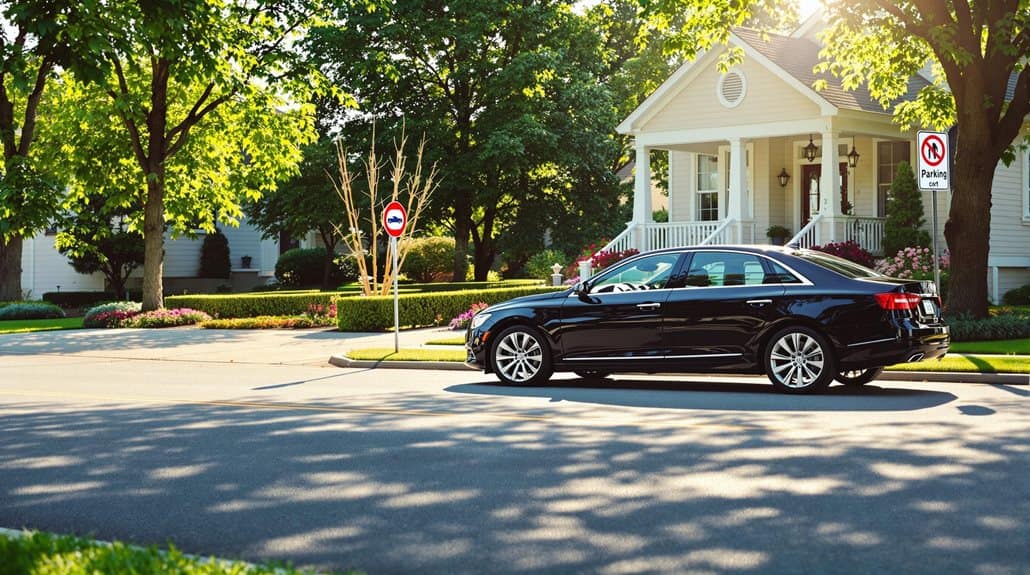Can People Park in Front of Your House? Legal Guide
You might think you have control over who parks in front of your house, but the reality is often more complex. Public roadways are usually shared spaces, and local laws dictate the rules surrounding parking. While you can't reserve a spot, certain regulations or permits could change the interactions. It's essential to understand your local codes, especially if parking disputes arise with neighbors. So, what happens when someone parks too close to your driveway, or when special permits come into play? The answers might surprise you.
TLDR
- Public roadways are communal, so individuals cannot reserve parking spots in front of their homes.
- Local parking regulations dictate that no parking can obstruct traffic or create hazards.
- Parking in front of a house is generally allowed unless restricted by specific signage or community rules.
- Homeowners cannot enforce their own parking rules on public streets; only municipal codes apply.
- Understanding local parking codes helps prevent disputes and ensures compliance with regulations.
General Parking Rules Overview
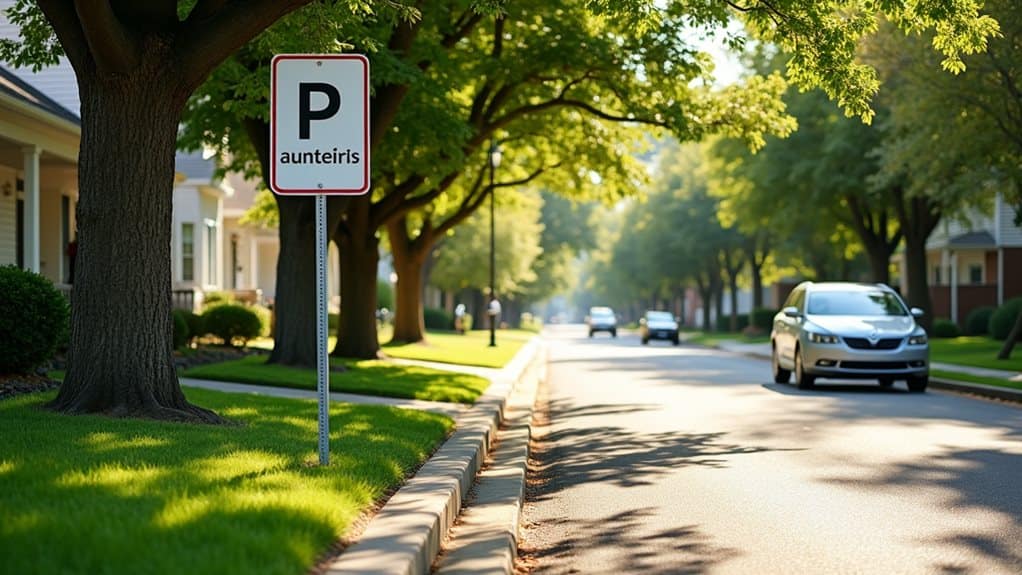
When it comes to parking on public streets, understanding the general rules is essential for avoiding fines or inconveniences.
You've gotta park parallel to the curb, with your right-side wheels just 18 inches away—yes, that's like a foot and a half! Parking restrictions apply at all times or as specified by signs/meters, so be sure to pay attention to any posted regulations. Additionally, be aware that public roadways cannot be reserved for individual homeowners, which means your neighbors can park in front of your house without violating any laws.
And remember, no part of your vehicle should be sticking out into the road. It's all about keeping things safe and orderly!
Prohibited Parking Areas
When you're parking near your house, you've gotta watch out for those prohibited zones, or you might just find yourself in a bit of a pickle!
Ever tried to squeeze your car in front of a fire hydrant or a safety zone?
Trust me, those spots are like the "do not enter" signs of the parking world, and ignoring them could lead to a ticket faster than you can say "parking violation!" Additionally, it's essential to remember that no parking within 10 feet of a fire hydrant is strictly enforced to ensure emergency access. Moreover, if you're part of a community governed by an HOA, be aware that expired tags on vehicles can lead to towing actions if not addressed promptly.
Common Prohibited Zones
Parking in certain areas near your home can lead to fines or towing, so it's essential to understand common prohibited zones.
You can't park less than 50 feet from a railroad crossing or 25 feet from intersections.
Also, give fire hydrants a 15-foot buffer, and keep 5 feet away from driveways.
Remember, no parking on sidewalks—save that for walking! Additionally, be mindful of residential restricted parking zones which can affect parking availability in your neighborhood.
Happy parking!
Safety Regulations Overview
Understanding prohibited parking areas is essential for ensuring safety and compliance with local regulations.
You wouldn't want a fire truck blocked, right? Always keep those lanes clear!
Plus, parking near fire hydrants, crosswalks, or in front of driveways? Nope, that's a no-go. Residential Permit Parking helps alleviate non-residential parking impacts, so be mindful of these rules to maintain access for emergency vehicles.
Follow these rules, and you'll help keep the streets safe, while avoiding the dreaded tow truck drama!
Local Code Variations
Local codes can vary greatly when it comes to prohibited parking areas, so it's essential to brush up on your local regulations. You wouldn't want to park in front of a fire hydrant or block a crosswalk, right? Trust me, it's not worth the ticket! Always check where you can park to avoid any surprises and keep things smooth for everyone. Remember, no parking adjacent to fire hydrants is a common regulation in many areas to ensure safety.
Happy parking!
Distance and Clearance Requirements
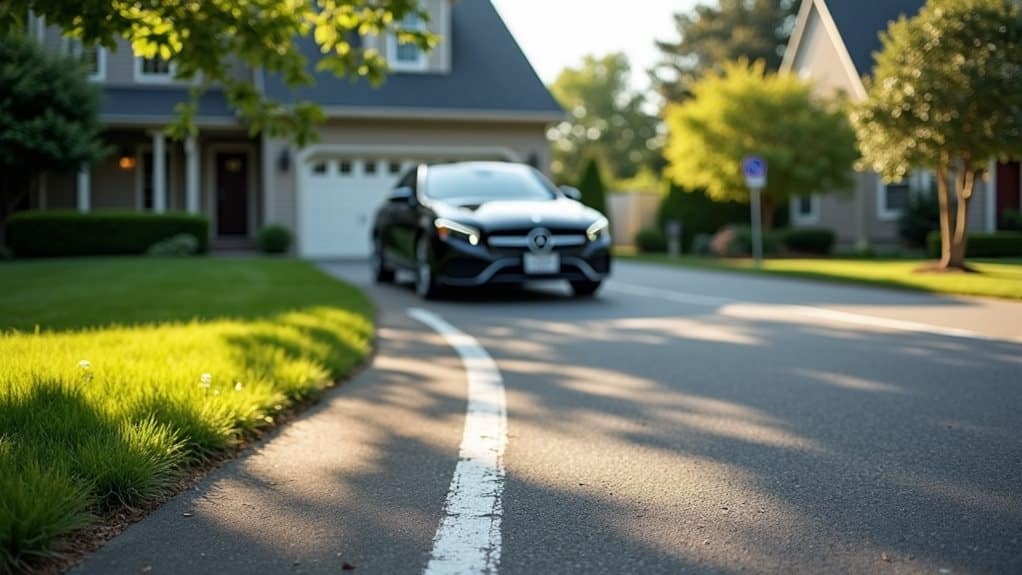
When planning a parking space in front of your house, you'll need to adhere to specific distance and clearance requirements to guarantee safety and compliance with local regulations.
You've got to keep at least 7.6 metres from intersections and a metre from utility boxes. Plus, don't forget that sweet 1-metre clearance from your front steps for emergency access—safety first, right? Additionally, it's important to remember that valid residential permits are required at all times in designated locations. Proper drainage management is also essential to prevent runoff issues that could affect parking areas and nearby properties.
Time Restrictions on Parking
When you're parking in front of your house, you've got to keep an eye on those time restrictions, or you might find yourself in a bit of a pickle!
Have you ever parked your car overnight, only to wake up to a lovely ticket on your windshield? Time limits prevent vehicle abandonment and ensure street accessibility. Additionally, HOA regulations can also dictate where you can park, further complicating your parking situation. From overnight regulations to those pesky time-limited zones, knowing the rules can save you from fines and even towing—so let's chat about how to avoid those parking pitfalls!
Overnight Parking Regulations
Overnight parking regulations can vary widely depending on your location, impacting where and when you can park on the street in front of your house. Some areas let you park overnight with a permit, while others ban it altogether, especially in winter. Permit holders must display valid permits to avoid fines during designated hours.
Time-Limited Parking Zones
Time-limited parking zones can markedly impact your daily routine and parking habits.
Imagine needing to dash into a store but only having 15 minutes! These limits, usually marked by signs, help keep things moving in busy areas. Just remember, if you exceed that time, you might wanna move your car at least 500 feet away to avoid a ticket—yikes! Additionally, it's important to note that digital parking permits are required for longer parking durations in residential zones, so make sure you're registered to avoid fines.
Violations and Penalties
Parking violations can lead to hefty penalties, especially when it comes to time restrictions.
If you park in school zones during specified hours, expect a $30 fine. Prohibited areas? That could cost you more, escalating up to $60!
And don't even think about blocking driveways or streets; fines can reach $95. Furthermore, vehicles must be moved every 24 hours from Monday to Friday to avoid additional penalties.
Penalties and Fines
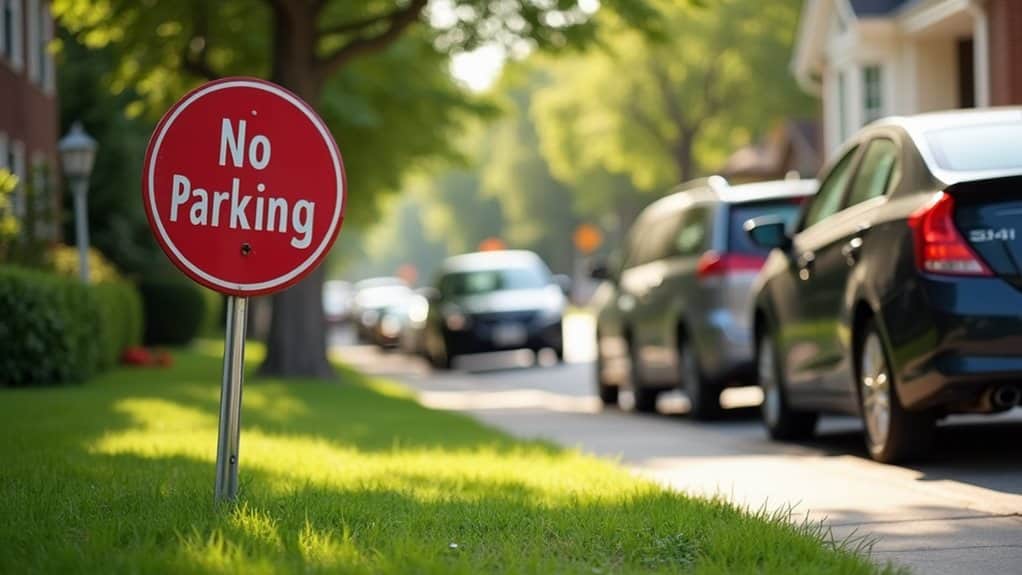
Ignoring parking regulations can lead to a range of penalties and fines that may quickly add up. You could face fines of $30 to $50 for various violations, plus late fees if you miss payments. Additionally, failing to comply with front yard parking regulations can result in further financial repercussions. It's important to remember that these fees are enforced under the authority of governing documents established by your HOA. Forgetting about those tickets? You might even get your license terminated!
Special Zones and Permits
Maneuvering through the complexities of special zones and permits can be essential for maintaining hassle-free parking in residential areas. You'll want to check if you qualify for residential parking permits, which can let you park freely on certain blocks. Just remember, even with a permit, you can't park on lawns or ignore the 72-hour rule. Additionally, annual permits are required for continued parking in designated areas.
Homeowners Association Regulations
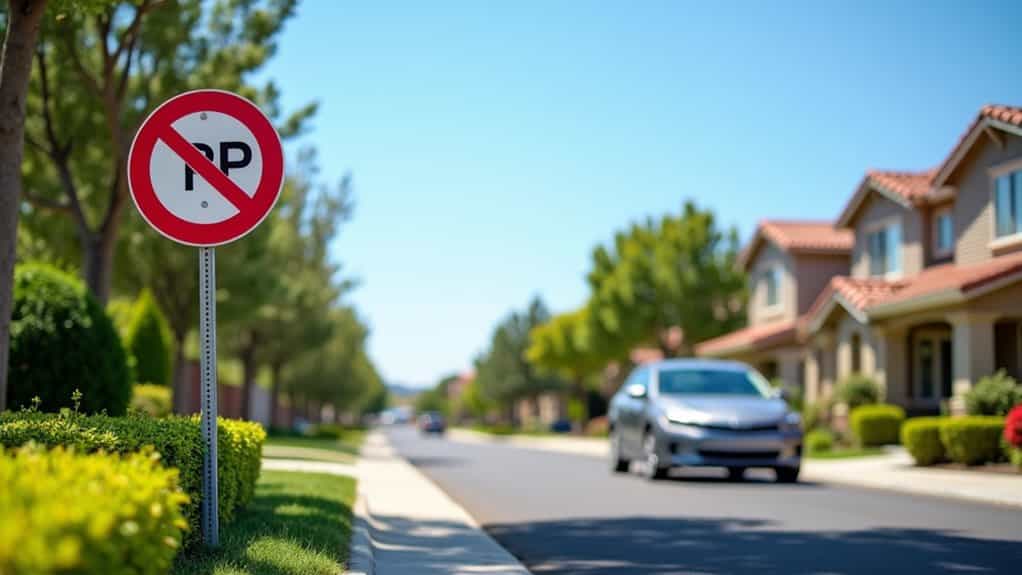
Homeowners Associations (HOAs) often impose regulations that can considerably affect where you park your vehicle in your community.
You might find specific parking spots reserved just for you, while others are off-limits.
Plus, if you've got an RV or a motorcycle, you may need to stash those in your garage. Common regulations provide consistency for residents in how parking spaces are utilized.
Local City Code Variations
Understanding local city codes is essential for homeowners who want to park legally and avoid fines.
In Toronto, you need permits for parking pads, and those can't just be passed around like a hot potato! Additionally, you must consider front yard parking pad permits when planning any parking-related construction on your property. Plus, you can't claim the spot in front of your house as your own—everyone's vying for that prime real estate.
Overall
So, there you have it! Parking in front of your house can feel like a game of musical chairs, right? Just remember, public roads are like a big playground for everyone, which means your neighbors can park there unless there are special rules. Keep your eyes peeled for those signs, and don't forget to check your local codes. And hey, if you ever get in a parking pickle, just laugh it off—life's too short to stress about a spot!

